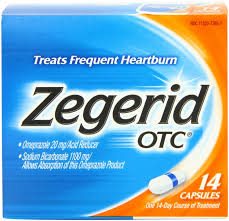 Studies have found higher rates of nephritis (kidney inflammation) and chronic kidney disease associated with Zegerid and other heartburn drugs. These kidney side effects are both risk-factors for kidney failure.
Studies have found higher rates of nephritis (kidney inflammation) and chronic kidney disease associated with Zegerid and other heartburn drugs. These kidney side effects are both risk-factors for kidney failure.
Need a Texas Zegerid Lawyer? Collen A. Clark is a true advocate for his clients and is passionate about helping Texans that have been injured or wronged. If you or a loved one was diagnosed with kidney failure, you should contact our lawyers immediately. You may be entitled to compensation by filing a lawsuit.
Overview
Zegerid is an antacid that combines sodium bicarbonate and omeprazole. These drugs work in different ways to decrease the production of stomach acid and stop heartburn.
Zegerid and Kidney Failure
Zegerid contains omeprazole (Prilosec), a proton-pump inhibitor (PPI) that has been on the market since 1989. Evidence linking PPIs and kidney disease has been growing for decades, with omeprazole linked to 17 cases of nephritis in the 1990s.
In recent years, a number of studies have found even more evidence. One study published in February 2016 linked PPIs with a 20-50% increased risk of Chronic Kidney Disease (CKD). When kidney disease progresses, it can eventually lead to kidney failure.
No one knows exactly why PPIs are associated with kidney problems, but the FDA has issued warnings about low magnesium levels, which could damage the kidneys. Repeated bouts of low-level inflammation (nephritis) could also cause kidney damage.
In December 2014, the FDA updated warnings to include acute interstitial nephritis. This hypersensitivity reaction causes sudden inflammation and swelling in the kidneys. About 50% of people with nephritis develop symptoms of kidney failure. It can also cause kidney failure without treatment.
Study Links Zegerid and 96% Increased Risk of Kidney Failure
A study published in the Journal of the American Society of Nephrology linked Zegerid and other anti-heartburn drugs in the PPI classs with a 26% increased risk of kidney disease and a 96% higher rate of kidney failure. The analysis was based on data from nearly 200,000 people, including 20,000 who used H2-blocker antacids and 170,000 who used PPIs.
At the end of the 5-year follow-up period, 15% of PPI users had been diagnosed with kidney disease vs. 11% of H2-blocker patients. The long-term use of PPIs (1-2 years) was associated with a 3X increased risk of kidney failure compared to short-term use (1 month or less). End-stage kidney failure only occurred in 0.2% of study participants, but it was twice as common among PPI users.
Dr. Ziyad Al-Aly, lead author of the study, warned:
“I think people see these medications at the drug store and assume they’re completely safe. But there’s growing evidence they’re not as safe as we’ve thought. [Patients should] use PPIs only when it is medically necessary, and should limit duration of exposure to the minimum necessary to treat the underlying medical condition.”
What is Kidney Failure?
Kidney failure, also known as end-stage renal disease (ESRD), occurs when the kidneys are unable to clean the blood or perform other essential functions. Health problems are caused by toxins and extra fluid accumulating in the body.
Symptoms of Kidney Failure
When the kidneys stop working altogether, patients may experience fatigue, weakness, pain in the abdomen or back, diarrhea, fever, nosebleeds, rash, vomiting, seizures, or coma (unconsciousness). These problems are caused by uremia, a condition in which the body is poisoned by excess water and wastes.
The early stages of kidney failure may produce the following symptoms:
- Persistent itching
- Muscle cramps
- Nausea and vomiting
- Loss of appetite and weight-loss
- Swelling in the feet and ankles
- Changes in urination (excessive amounts or not enough)
- Shortness of breath
- Trouble sleeping
Treatment for Kidney Failure
The only treatments for kidney failure are dialysis or a kidney transplantation. There are two major forms of dialysis — hemodialysis and peritoneal dialysis — that clean the blood in a machine or in the abdomen. Organ transplantation can cure kidney failure, but recipients often must wait years for a donor organ and they will need to take anti-rejection medication for the rest of their life.
Need a Zegerid Lawyer in Texas?
Collen A. Clark is a true advocate for his clients and is passionate about helping Texans that have been injured or wronged.
Collen’s amazing success in the courtroom and well known dedication to his clients has earned him the recognition of his peers as one of The Top Trial Lawyers in Texas.”
The Clark Firm has assembled a team of trial lawyers with more than 100 years experience, participation in over 600 jury trials and $260 million in verdicts and/or settlements. Please use the form below to contact our Texas Zegerid lawyers for a free lawsuit review.


 To contact us for a free review of your potential case, please fill out the form below or call us toll free 24 hrs/day by dialing:
To contact us for a free review of your potential case, please fill out the form below or call us toll free 24 hrs/day by dialing: